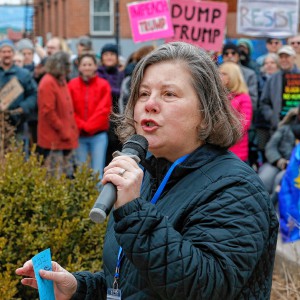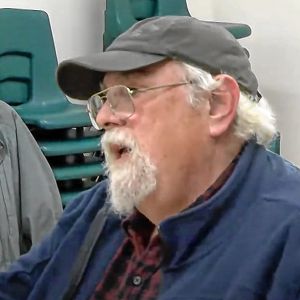The long view: Reflecting on 30 years in local journalism
|
Published: 06-28-2024 3:25 PM
Modified: 06-28-2024 5:05 PM |
In the early 1990s, I answered an ad for a reporting job at the Gazette. I had editorial experience — I’d worked as a copywriter, a copy editor, and a proofreader — and I liked writing, but I’d never worked for a newspaper, unless you counted a few pieces I’d written for my high school paper.
There was a key reason for that: I was not, and never have been, an outgoing person, and I’d always thought that was pretty much a prerequisite for a job that involved approaching people you don’t know and asking them questions.
But at that point in my life, I needed a job, so I sent my resume and some writing samples to the Gazette. I got the position, covering the town of Hatfield.
A little over 30 years later, I’m retiring from the paper, never having imagined when I started that I’d work here as long as I did. But life — such as learning you’re about to become a parent — has a way of taking its own course, and here I am.
Much of that is due to the opportunities I had, working at a small paper like the Gazette, to do different things. In my early years at the paper, in addition to Hatfield, I covered Hadley and then parts of Amherst while also writing regional news stories; then I covered the University of Massachusetts and the other local colleges as part of a higher education beat.
I also wrote occasional editorials for the paper at one point, and I served some stints as a part-time arts editor. But I found my real niche as a staff writer for the former Hampshire Life magazine, writing longer cover stories that could be about any number of topics: arts and entertainment, history, politics, sports, energy and the environment, profiles of people in the Valley, even hard news like crime.
I welcomed the opportunity to be a little more expressive with my writing and to take an in-depth look at different subjects. Not having a daily deadline was a bit of a relief, too, though the longer stories could bring their own form of pressure.
And after spending roughly 10 years at Hampshire Life, I’ve spent most of the last 12 years or so as the Gazette’s arts and feature writer, covering music, books, visual arts, film, theater, dance and a few other things. It’s been a great vantage point for getting a better grasp on the richness of the region’s arts scene.
Article continues after...
Yesterday's Most Read Articles
 Local ‘Hands Off!’ standouts planned as part of national effort
Local ‘Hands Off!’ standouts planned as part of national effort
 Long-vacant former Faces spot in Northampton gets new tenant
Long-vacant former Faces spot in Northampton gets new tenant
 Here come the sweetness: Four new businesses prepping to open in downtown Northampton
Here come the sweetness: Four new businesses prepping to open in downtown Northampton
 State senators organize Trump defense: Comerford a leader on Response 2025 initiative
State senators organize Trump defense: Comerford a leader on Response 2025 initiative
 Five UMass Amherst students have visas, student status revoked
Five UMass Amherst students have visas, student status revoked
 Hatfield Select Board removes elected Housing Authority member
Hatfield Select Board removes elected Housing Authority member
Somewhere along the way, I also developed the ability to overcome my basic shyness and set up interviews, ask questions, and move on to the next story, though the butterflies never completely disappeared. A few months ago I worried about talking to Madison Cunningham, a Grammy winning songwriter and guitarist about whom I knew next to nothing. (The interview went fine in the end; I did a lot of cramming on her music beforehand.)
I think covering the arts has helped in that sense. News reporting can be hard, especially trying to get comments from people who don’t want to talk to you or don’t like the media. I had my share of combative interviews in the past and wrote stories on difficult subjects, the kind that can often leave someone you’ve spoken to unhappy (or worse).
But artists are generally pretty interested in talking about their work, even if the well-known ones have fielded a lot of the same questions before; it makes for more of a conversation than a formal interview.
That doesn’t mean everything goes smoothly. About 10 years ago, I spoke with Jeff Daniels, the veteran actor who’s also an accomplished fingerstyle guitarist and songwriter. He was coming to the Iron Horse in Northampton with a small band to play his songs, part of a tour to raise money for a theater he owns and manages in his hometown of Chelsea, Michigan.
I’d arranged to interview Daniels a couple weeks before his gig, and I was pretty nervous; at that point he may have been the most famous person I’d ever talked to. So it didn’t help when my phone rang and he said “Hi, this is Jeff Daniels” with all the enthusiasm of someone reporting to his probation officer.
Luckily, I’m a fingerstyle guitarist myself, so I focused most of my questions on guitars and acoustic music, and we discovered a mutual interest in tunes like Doc Watson’s “Deep River Blues” and Jorma Kaukonen’s version of “Hesitation Blues.” Daniels soon warmed up and we had a good chat; he shared a few Hollywood anecdotes as well (and he put on a great, funny show at the Horse).
It was a reminder that if you do your research on a topic (I had), come up with decent questions, and speak to a person’s interest and background (and find a few personal points of similarity without injecting yourself too much into the conversation), you can usually get a pretty good interview, even if things might be a little dicey or awkward at first.
It’s hard to recall all the folks I’ve spoken to over the years, but I’m struck by how gracious a lot of people have been with me, from noted musicians outside the area — Lori McKenna, Tommy Emmanuel, Keb Mo — to talented players who live or have lived locally, such as some of my favorite guitarists: Brooks Williams, Jim Henry, Chris Smither, John Sheldon.
In fact, I’ll be forever grateful to Emmanuel, the great instrumental guitarist, for calling me back after I messed up the time of our interview and called him half an hour late. I was on a very tight deadline and may have left a slightly panicked message with him. But he rang me back 10 minutes later and waved away my apologies: “No worries, brother. Happy to talk to you.”
I also remember a Hampshire Life profile I did of Northampton painter Nanny Vonnegut as she was preparing for an exhibit of new work that examined her relationship with her late father — a guy named Kurt Vonnegut. It was an emotional time for her, but she shared her story, and I think we got a really good article out of it. (Her work is funny as hell, by the way — she inherited her dad’s droll sense of humor.)
And sometimes a great interview and good subject material made for a magical alchemy when it came to writing a story. After I spoke to Jarrett Krosoczka, the Florence illustrator and kids’ writer, about his graphic memoir/novel, “Hey, Kiddo,” and to Whately author George Howard Colt about “The Game,” his portrait of a memorable football game between Harvard and Yale in the turbulent late 1960s, the words seemed to flow from my fingertips without effort.
Both times I remember thinking, “Why can’t all my stories come together like this?”
In retrospect, I’m very grateful to all the people I spoke to who spent time answering my questions. Covering the arts has not only introduced me to some very talented folks, it’s been an antidote at times to the often ugly news around us, from mass shootings and war to angry politics and environmental disasters. It’s an important reminder that the our species is capable of good things.
Writing about the arts and doing other features has also helped soften some of the changes, particularly the downsizing in recent years, that have occurred at the Gazette during my tenure.
When I started here, we worked on weird, clunky little computers that looked like props from the Starship Enterprise in the early days of “Star Trek.” But the newsroom was a bustling place, like a smaller version of the ones seen in Hollywood dramas about journalism, with editors shouting for copy as deadline approached and probably three times as many reporters and regular freelancers as we have today.
We had three copy editors, too, an unheard-of luxury now.
Over the years, we got better, more modern computers as well as internet service, and even as our editorial staff got smaller, the Gazette regularly won awards in annual New England newspaper competitions.
The bottom fell out in 2020 with the arrival of COVID-19. By the end of the year, I was the only person left in the Features “department,” Hampshire Life had been discontinued, and the paper had shrunk in size.
There’s no sugarcoating it. Things got tough here for several years, just as they did for so many other newspapers. A recent report I came across says an average of 2.5 local U.S. newspapers shut down every week in 2023. In the last few years, I’ve often felt like the amount of coverage I can provide to our busy arts scene is pretty inadequate.
But I’m proud that the newspaper has held on with the support of the Gazette’s parent company, Newspapers of New England. My colleagues (well, former colleagues now) are working as hard as ever to cover important community stories and make sure this region does not become a local news desert.
And as I retire, I trust the Gazette will find a strong feature writer to take my place, someone who can bring fresh energy and maybe some new angles and ideas to the position.
Thanks to all the people who gave me feedback on my pieces or suggested stories to pursue. We can’t do a good job without the support of the readers who have stuck with us.
And maybe I’ll be coaxed into doing some freelance writing for the paper sometime down the road.
















 Amherst can’t decide where it is: Is town center uptown or downtown?
Amherst can’t decide where it is: Is town center uptown or downtown? Here to help the community’s artists: Human Scale Art Space aims to advance visual arts in the Pioneer Valley
Here to help the community’s artists: Human Scale Art Space aims to advance visual arts in the Pioneer Valley Get Growing with Mickey Rathbun: Paving over historic beauty: A history of the White House Rose Garden that Trump plans to rip up
Get Growing with Mickey Rathbun: Paving over historic beauty: A history of the White House Rose Garden that Trump plans to rip up Valley Bounty: Nothing sweeter than sourcing local: Lemon Bakery in Amherst is a small, seasonal, from-scratch operation
Valley Bounty: Nothing sweeter than sourcing local: Lemon Bakery in Amherst is a small, seasonal, from-scratch operation
